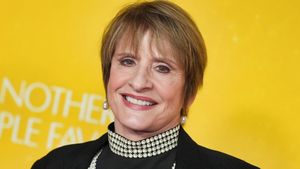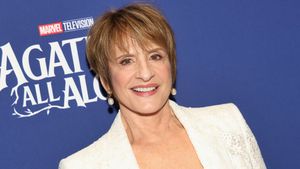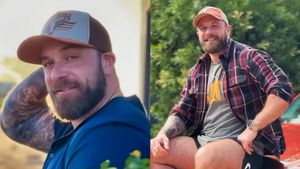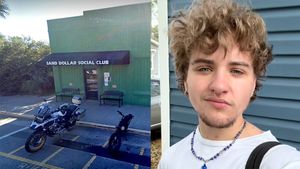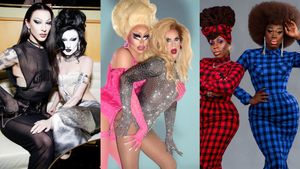The It Gets Better Project is celebrating its 10th anniversary.
The nonprofit, which began with Dan Savage and Terry Miller's viral movement of recording videos of hope for LGBTQ+ youth in order to prevent suicide, is now helmed by Brian Wenke, the executive director since 2016.
A born fundraiser, Wenke raised $25 million for the American Cancer Society, Greater Los Angeles Zoo Association, and Art Share LA before arriving at the It Gets Better Project. Through partnerships with Fortune 500 companies, the nonprofit has received $5.5 million in support under Wenke's leadership.
However, it is Wenke who feels like a beneficiary. "I feel very fortunate I've got to take a ride on this train -- and to do it at a time where it's seeing a major milestone," he told The Advocate in a recent phone interview.
"It's something that I always have to remind myself when I'm discouraged about what's happening in the news -- that there's still progress to be seen and progress is still very much a long game," he said. "And the fact that [the It Gets Better Project is] still here 10 years later, continuing to be relevant to younger audiences, is an incredible accomplishment."
Indeed, a lot has changed since 2010. YouTube was once "this place where people posted cat videos," Wenke recalled; now it is a place filled with "land mines" of misinformation and political division.
But It Gets Better has evolved along with the social media landscape, continuing to offer resources for LGBTQ+ youth in need, like its collection of lifesaving stories from out leaders and allies. "We were born in response to a very tumultuous time for LGBTQ+ youth," said Wenke, noting how it was created as a response to the suicide crisis among this demographic.
Savage did not intend to create a movement when he and his husband, Miller, first shared their coming-out journeys; he just wanted "to impart the wisdom to get them through to the next day, to give them a shred of hope that life can get better," said Wenke, who compared the initial viral wave of It Gets Better videos to the ALS Ice Bucket Challenge. Other than the clip recorded by President Barack Obama, Savage and Miller's video remains the most memorable for Wenke.
"It was obviously the one that launched the movement. But you know, there's something about sharing your story in that format that's very raw. And I didn't realize how raw and tough it would be until I put myself in front of the camera," he said.
Today, over 50,000 celebrities, public figures, influencers, and ordinary folks have told their stories to help save lives; in total, these videos have accrued over 50 million views. The nonprofit founded by Savage and Miller now spans 17 countries across four continents and has storytelling initiatives in six major languages. It the largest organization in the world utilizing storytelling to empower LGBTQ+ youth.
In the past decade, Wenke has also seen an important shift in this storytelling. In the beginning, many of these accounts focused on the trauma of family and peer rejection. But "what we're finding now is that today's youth are really focused on the positives, that they recognize and embrace the shared trauma, but really are looking for proactive ways to take control of their world," he said.
Whereas, at the outset, it was adults who gave hope and information to young people, now it can also be a two-way street for a digitally native generation that is leading the charge for visibility and activism. "They're so self-actualized. So open. So plugged into the concept of identity to the fact that they're building a whole new language around it that even older generations are like, 'I don't know what that means anymore,'" Wenke said of LGBTQ+ young people, adding, "It's really exciting to see."
Of course, It Gets Better also launched during the Obama years, which saw many landmark gains in the LGBTQ+ rights movement -- most notably, marriage equality. For many, however, that sense of optimism has died under President Trump, who has made lives worse for queer people -- the transgender community, in particular -- through dozens of attacks on the federal level.
In recent years, hate crimes against LGBTQ+ people have escalated and crisis hotlines for youth have been flooded. The pandemic has brought its own widespread despair to the world -- and its damage has been disproportionate in vulnerable communities.
Needless to say, saying "It gets better" means something different today than it did 10 years ago. It requires a longer view of history that recalls the famous quotation from Martin Luther King Jr., "The arc of the moral universe is long, but it bends toward justice."
"I do feel that there's this perception that for something to get better, it means that there has to be glitter and rainbows and life is easier. And as an as a queer adult who experiences his own issues and having the luxury of hindsight to look back at my life and where I've gotten to where I am today, progress is not a straight line," Wenke said. "And there are highs and lows. And there are days where even I feel like, 'Oh, my gosh, is this going to get better?'
"But I think what is most important is that people maintain a sense of hope, and some shred of optimism for the future. Because progress is happening, whether or not it is in your face, right? There are people out there every day making sure that we stay on this path."
The It Gets Better Project team members are among those people fighting for progress. During socially distant times, the nonprofit has the advantage of being born and raised in a digital space. Although the staff now work from home during the pandemic, the group's reach has only expanded through initiatives like It Gets Better: A Digital Pride Experience, its first virtual event that featured stars like Peppermint, Mel C, Scott Hoying, Mitch Grassi, and Jujubee spreading Pride across three days of programming.
This week, the nonprofit also launched 10 Years Better, a series in which folks like YouTube star Gigi Gorgeous rewatch and react to their original It Gets Better video -- and once again deliver an optimistic message for young people. "It's only going to get better," Gorgeous assured in the new video, "and I'm very hopeful for the future."
In the near future, It Gets Better plans to release another video series, this one uplifting the voices of young LGBTQ+ activists who are also inspiring change and fighting for a range of intersectional issues like immigration reform, gun control, gender equality, and racial justice. The goal is to show young people "that they can have a voice, that they can influence our local communities in vastly important and meaningful ways," Wenke said. It will also lend a spotlight to other nonprofits whose work and fundraising have been more impacted by the health crisis.
However, It Gets Better Project has a delicate dance during the election year and beyond. While its LGBTQ+ advocacy makes it progressive, it is also an apolitical nonprofit. Wenke stressed the importance of not wanting to "label anything that is really not within our wheelhouse as not natural."
"There are lots of young queer conservative people out there, and it's OK, right? But in terms of how we're also going to respond to the outcomes of this year's election, we're going to do everything we can to make sure that we are visible, so that young queer people have a place to go to, to be reminded that there is a lot of great stuff happening in the world right now," he said.
"It's probably not like a sexy response," Wenke added with a laugh, "but [the election is] not going to be a crisis for everybody. And we have to recognize that."
Even in this divided moment in history, Wenke promised that It Gets Better would not turn away a figure based on their political affiliation, as long as their desire to share their story is "based in purity of heart and intention."
"We want to share it if we feel that it's going to be a relevant story for LGBTQ+ youth. We don't want to diminish an experience because of a political overlay," he said.
So, where does Wenke see the It Gets Better Project in another 10 years? "I would like to think that the dream for any nonprofit is to put themselves out of business," he said. "Our vision is a world where all LGBTQ+ youth are free to live equally and know their worthiness and power as individuals."
But a lot can happen in a decade, as the last one has shown. Whatever may come, "I would like to see a healthier utilization of social media and a healthier outcome for young LGBTQ+ people who are born into a toxic social narrative," Wenke concluded.







































